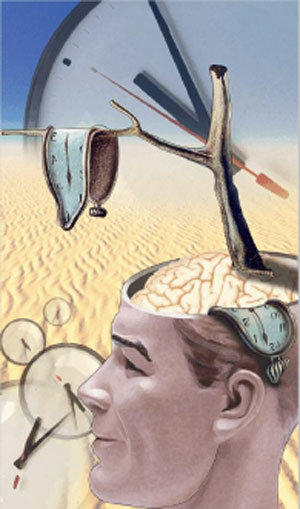The More You Remember, the Slower Time Passes
The More You Remember, the Slower Time Passes
Posted September. 12, 2005 10:35,

Why Life Speeds Up As You Get Older
Written by Douwe Draaisma, translated by Kim Seung-muk (408 pages, 16,500 won, published by Echoleaves)
One thing sure about our memories is that our lives began with the loss of memories. Our first memories date back to somewhere between two and four years of age at best.
Memories from our younger days are lost memories. Not only can we not remember one bit of what happened before, but we also dont have any memories of the long period since then. It is like lights flickering here and there in the long tunnel of darkness that is forgetfulness.
Common sense tells us that remembrance and forgetfulness are not compatible. Where remembrance ends, forgetfulness starts, and where forgetfulness ends, remembrance starts. However, somewhere, in areas not covered by this dichotomy, our faint memories float around. They consist of memories that we remember from the past, but we cannot bring alive in the present.
Remember those times when a word is on the tip of your tongue. Amazingly sometimes, the particular word you are thinking of does not show up at all, but it continuously suggests its existence. It is sort of a specter of a word that we want to find that beckons to us from the cracks of our consciousness.
This book looks into several aspects of our autographic memories, which are our personal histories and the chronicles of our lives. Author Douwe Draaisma (Professor of the History of Psychology at the University of Groningen, The Netherlands) did more than just describe research results from laboratories. He borrowed literary metaphors from Proust and Borges to stimulate our intelligence and imagination on our memories, minds, lives, and time.
However, by thinking about those things, we might feel like we are looking at a mirage. William James said, Looking at ones insides is like turning on lights to see how the darkness looks like.
Why Do We Have Déjà Vu, a Feeling of Having Already Experienced a Present Situation?-
Is déjà vu, which gives us even an eerie feeling, an echo that the memories of our former lives make in experience of our current reality? Or, if it is not a memory of our former lives, do memories of what existed in our brains in the past reappear in the form of déjà vu?
Déjà vu may be what we saw and experienced in our dreams rising to the surface of our consciousness. We can look at Freuds theory which claims that the remains of the day appear for a short time and pass away from opposite view.
Does Time Go by Faster as We Become Older?-
The length and speed of time is made in our memory. In other words, the core of time sensation is in memory. The recognized time of humans ticks and fades away with our memory, matching our internal clock in harmony.
We best remember instances that happened in our late-teens and early 20s. The amount of human memories surges during that time. Time milestones such as when I met someone for the first time and when I did something for the first time in my life are concentrated in that period.
As we can remember more memories of that period, the length of that period naturally feels longer. When we pass middle age, our memory milestones decrease, our memory begins to show cracks, and we sometimes end up feeling like time goes by faster than before. (This is called a reminiscent effect.)
If Someone Has Absolute Photographic Memory, is It a Blessing for Him or Her?-
Most insomnia patients have to live with a curse, an absolute photographic memory, even if it only lasts for a short time. When they wait for comfortable dream, they have to go through very vivid and lively nightmares, called the tyranny of memory. They are nailed by their past, which their memory constantly recalls for them.
If we can precisely remember trees or faces that we saw yesterday, the same tree or the same person will be felt differently today. As normal people will feel different sensations when they see those objects a few years or a few decades later, those who have an absolute photographic memory feel renewed sensations whenever they see an object every time. They are just like the people with no memory at all!
Gi-U Lee keywoo@donga.com






